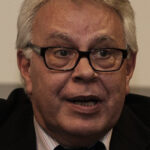They are representatives of Libyan civil society (political parties, electoral commissions or city council journalists, members of NGOs) from five cities (Darna, Benghazi, Azawia, Zelitin, and Ubary).
González sat at the table and recommended viewing things“with concern, patience, and true calm,” because, he explained, “the historic processes have to be given time, they are not built overnight.”
The biggest difficulty for Libya, according to the former President, is finding an area of consensus amidst the immense complexity of the country and also finding a new generation of Libyan leaders that must go “take care of the situation” and that are capable of generating enough common ground to “create a state, a legislation, a democracy that respects diversity and is inclusive.” In regards to this, González explained that “the West does not often see that in Libya there exists a very complicated trial system. Agreement may not be between four or five parties, but between multiple communal and regional tribes,” González affirmed.
He also identified the problem that emerged in the postwar period: “In the war, one is with Gadafi or against Gadafi. It’s simple. But each of the communities was against Gadafi for different reasons, and once the dictator was overthrown, each of them wanted to fix their own accounts without relying on the new powers.” González advised them of another danger: that moving past the conflict against Gadafi, a postwar period of hidden civil strife, in which each wants to feel as though they are owners of their own territory.”
Whatever the difficulties, González recommended a spirit of consensus: “Libya has to have an idea of country and include in the project all type of awareness in order to be able to organize peace.” The former President warned that this road is not a straight line: “The general interests cannot be the sum of the interests of each tribe but must able to represent all.” As such, the former President recommended a filtering of the responsibilities of the old regime within certain limits so as not to increase vengeance. “They have to maintain a dialogue with the defeated, because it is essential to integrate them. One cannot hold accountable more than 1.5 million Libyans. They cannot stop talking with the defeated.” The Spanish leader reminded them that “creating the structure of a state is not gong to be easy” and that it is a task that must be done with dialogue and agreements. He expressed the need for the political parties to be “cross-cutting,” overcoming tribal interests. “Although this remains to become a social reality,” González said.
“The immense advantage of Libya is that it is a large country with few inhabitants and enormous resources that can give a good living standard to its inhabitants if its leaders are able to organize coexistence and construct a state for all,” stressed González.
